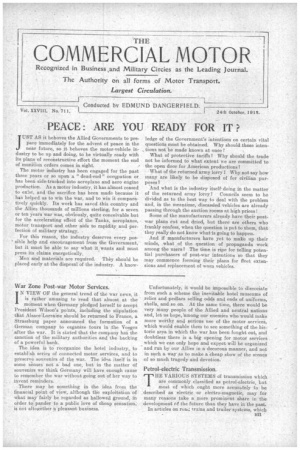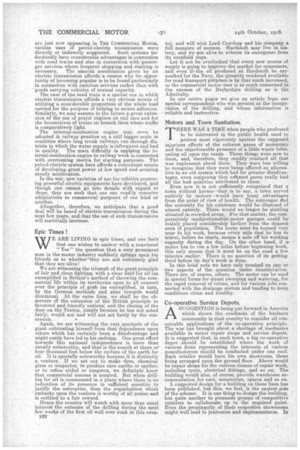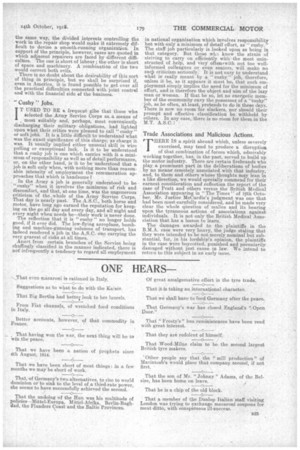War Zone Post-war Motor Services.
Page 1

Page 2

Page 3

If you've noticed an error in this article please click here to report it so we can fix it.
IN VIEW OF the general trend of the war news, it is rather amusing to read that almost at the moment when Germany pledged herself to accept President Wilson's points, including the stipulation that Alsace-Lorraine should be returned to France, a Strassburg paper announced the formation of a German company to organize tours in the Vosges after the war. It is stated that the company ha ii the sanction of the military authorities and the backing of a powerful bank.
The idea is to reorganize the hotel industry, to establish series of connected motor servioes, and to preserve souvenirs of the war. The idea itself is in some senses not a. had one, but in the matter Of souvenirs we think Germany will have, enough cause to remember the war without going out of her way to invent. reminders. . • There may be something in the idea from the financial point of view, although the exploitation of what may fairly be regarded as hallowed ground, in order to pander to a public love of cheap sensation, is not altogether a pleasant business. Unfortunately, it would be impossible to dissociate from such a scheme the inevitable hotel museums of relics and pedlars selling odds and ends of uniforms, shells, and so on. At the same time, there would be very many people of the Allied and neutral nations and, let us hope, 'among our enemies who would make more worthy and serious use of the motor serviced, which would enable them to see something of the historic area in which the war has been fought out, and doubtless there is a big opening for motor services which we can only hope and expect will be organized and run by our Allies in a decorous manner, and net in such a way as to make a"cheap show of the scenes of so much tragedy and devotion.
Petrol-electric Transmission..
TIIE VARIOUS SYSTEMS Of transmission which are commonly classified as petrol-electric, but most of which ought more accurately to be described as electric or electro-rnagnetie, may for many reasons take a more prominent share in the development of the future than they have in the past.
In articles on roat.: trains and trailer systems, which are just now appearing in TH. COMMERCIAL MOTOR, various uses of petrol-electric transmission were directly or indirectly suggested. Such systems
doubtedly have considerable advantages in connection with road trains and also in connection with passenger services, where frequent stopping and starting is necessary. The smooth acceleration given by an electric transmission affords a reason why its opportunity of becoming popular is to be found particularly in connection with omnibus services rather than with goods carrying vehicles of normal capacity. The case of the road train is a special one in which' electric transmission affords a very obvious means of utilizing a considerable proportion of the whole load carried for the purpose of helping to secure adhesion. Similarly, we may assume in the future a great extension of the use of petrol engines on rail cars and for the locomotives of trains on branch lines where traffic is comparatively light.
The internal-combustion engine may even be adopted in railway practice on a Still bigger scale in countries where long trunk railways run through districts in which the water supply is infrequent and had in quality. The main difficulty in applying the internal-combustion engine to railway work is connected with overcoming inertia for starting purposes. The petrol-electric system here affords a convenient means of developing great power, at low speed and securing steady acceleration.
In the war, new varieties of use for vehicles possessing powerful electric equipments have developed, and though one cannot go into details with regard to these, they are such that one can readily conceive adaptations to commercial purpose's of one kind or another.
Altogether, therefore, we anticipate that a good deal will be heard of electric transmission during the next few years, and that the use of such transmssions will materially increase.
Epic Times I
WE ARE LIVING in epic times, and one feels that one wishes to answer with a convinced " Yes " the question that a very prominent man in the motor industry suddenly springs upon his friends as to whether•they are not extremely glad that they are alive!
We are witnessing the triumph of the great principle of fair and clean fighting, with a clear field for all (as exemplified in Britain's method of throwing the commercial life within its territories open to all corners) over the principle of grab (as exemplified, in turn, by the German methods and aims towards world dominion). At the same time, we shall he the observers of the extension of the British principle to favoured and friendly nations; and the closing of the door on the Teuton, simply because he has not acted fairly, would not and will not act fairly by the con cession. .
Again, we are witnessing the vast spectacle of the giant extricating himself from that dependence upon others which has certainly been a disadvantage and might easily have led to his undoing. One great effort towards this national independence is more than i usually noteworthy, and that s the search at three 0r four thousand feet below the surface of the earth for oil. It is specially noteworthy because it is distinctly a venture. If we set out to make dyes, chemical glass or magnetos, to produce rare earths or spelter, or to refine nickel or tungsten, we definitely know that commercial success is assured. But when drilling for oil is commenced in a place where there is no indication of its presence in sufficient quantity to justify the enterprise, then the organization which embarks upon the venture is worthy of all praise and is entitled to a fair reward.
Hence the country will watch with more than usual interest the outcome of the drilling during the next few weeks of the first oil well ever sunk in this coun n22
try, and will wish Lord Cowdraar and his company a full measure of success. Hardstoft may live in history, and we are alive to witness its emergence from its cornfield days.
Let it not be overlooked that every new source of supply is going to improve the market for consumers, and even ifs the oil produced at Hardstoft be earmarked for the Navy, the quantity rendered available for road transport purposes is by that much increased, so the commercial motor user is as much concerned in the success of the Derbyshire drilling as is the Admiralty. In our centre pages we give an article frqm our special correspondent who was present at the inauguration of the drilling, and whose information is reliable and instructive.
Motors and Town Sanitation.
HERE WAS A TIME when people who professed to be interested in the public health used to protest most vigorously against the supposed injurious effects of the exhaust gases of motorcars and the objectionable presence of a little waste lubricating oil upon the roads. These things were new to them, and, therefore, they readily realised all that was unpleasant about them. They were less willing to recognize that they were being offered an alternative to an -old system which had far greater disadvantages, even supposing that ethaust gases really had all the bad qualities attributed to them. Even now it is not sufficiently recognized that a town without horses—that is to say, a town served entirely by motors—would have many advantages from the point of view of health. The scavenger asid the necessity for his existence would be disposed of almost entirely. There would no longer be stabling situated in crowded areas. For that matter, the comparatively unobjectionable motor garages could be mainly placed considerably farther from the densest area of population. The horse must be housed very near to his work, because every mile that he has to travel, before he starts, means a mile off his working capacity during the day_. On the other hand, if a. motor has to run a few miles before 'beginning work, this only means that it must be on the road a few minutes earlier.' There is no question of its getting tired before its day's work is done. In this brief note we have enly touched on one or two aspects of the question under consideration_ There are, of course, others. The motor can be used in special forms for street sweeping and watering, for the rapid removal of refuse, and for various jobs connected with the drainage system and tending to keep conditions clean and healthy. -, Co-operative Service Depots,
ASUGGESTION is being put forward in America which shows the readiness of the _business community in that country to consider all conceivable applications of the co-operative principle. The war has brought about a shortage of mechanics available in motor repair shops and service depots. It is suggested that, in each town, a big co-operative depot should be established where the work of various firms representing the interests of various manufacturers should be conducted under one roof. Each retailer would have his own showroom, these being arranged upon the ground floor. Above would be repair shops for the various classes of repair work, including tyres, electrical fittings, and so on. The building would also, of course, provide warehouse accommodation for cars, accessories, spares and so on. A suggested design for a building on these lines has been published, but this, we feel, is the easiest side of the scheme. It is one thing to design the building, but quite another to persuade groups of competitive retailers to collaborate up to the required point. Even the propinquity of their respective showrooms might well lead to jealousies and unpleasantness. In
the Eiame way, the divided interests controlling the _work in the repair shop would make it extremely difficult to devise a smooth-running organization. In support of the principle, however, cases are quoted in which adjacent repairers are faced by different dlifficulties. The one is short of labour ; the other is short of space and machinery. A combination of the two would correct both evils. There is no doubt about the desirability of this sorb of thing in principle, but we shall be surprised if, even in America, it is found possible to get over all the practical difficulties connected with joint control and with the financial side of the business.
" Cushy " Jobs.
IT USED TO BE a frequent gibe that those who Selected the Army Service Corps as, a means of , most suitably and, perhaps, most conveniently discharging their military obligations, had lighted upon what their critics were pleased to call " cushy " or soft jobs. It is a little difficult to understand what was the exact significance of this charge. as charge it was. It usually implied either unusual skill in wire pulling or exceptional luck. Is it to be understood that a cushy job is one which carries with it a minimum of responsibility as well as of detail performance, or, on the other hand, is it to be understood that a job is soft only when, with nothing more than reasonable intensity of employment the remuneration ap
proaches that whichis handsome? . . In the Army a. job is generally understood to be "cushy" when it involves the minimum of risk and discomfort, and that, at one time, was the ungenerous criticism of the whole of the. Army Service Corps. That day is nearly past. The A.S.C., both horse and motor, have long ago earned the reputation for keeping on the go all day and every day, and all night and every night when needs be—their work is never done. The reflection that it is " cushy " no longer holds good, if it ever did. The low-flying aeroplane, bombing and machine-gunning columns of transport, has indeed rendered a job in the A.S.C. in national organization which involves responsibility but with only a minimum of detail effort, as "cushy." , The staff job particularly is looked upon as being in that category. But those who know the strain of striving to carry on efficiently with the most uninstructed of help-, and very ofteniwith not too wellinformed colleagues or even seniors, will make no suck criticism seriously. It is not easy to understand what is really meant by a " cushy" job, therefore, unless it be, as it appears it Must be, that such employment simply implies the need for the minimum of effort, and is therefore the object and aim of the lazy man or woman. If that be so, let no energetic member of the community envy the possessor of a "cushy" job, as he often, at least, pretends to do in these clays. There is now no room for slackers, nor should their prompt and effective classification be withheld by others. In any case, there is no room for them in the M.T. A.S.C. I Trade Associations and Malicious Actions. HERE IS a spirit abroad which, unless severely exorcised, may tend to produce a disruption of that combination of forces which, admirably working together, has, in the past, served to build up the motor industry. There are certain firebrands who play a prominent part in the deliberations of bodies by no meansremotely associated with that industry, and, to them and others whose thoughts may lean in a like direction, we would specially commend for their earnest consideration and reflection the report of the case of Pratt and others versus the British Medical Association appearing in " The Times" of lgth October. Mr. Justice McCardie's judgment was one that had been most carefully considered, and he made very clear the whole question of malice and its bearing upon the tyrannous aotions of associations against individuals. It is not only the British Medical Association that has a lesson to learn. The damages -awarded to the plaintiffs in the B.M.A. case were very heavy, the judge sta.ting that they ware intended to be not merely nominal but substantial, for, in his lordship's opinion, the plaintiffs in the case were boycotted, punished and pecuniarily damaged without just cause in law. We intend to return to this subject in an early issue.






















